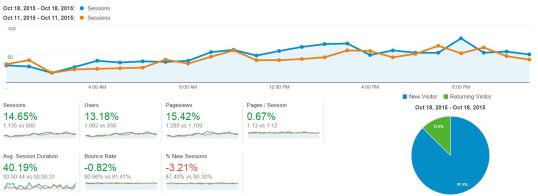I check my Twitter notifications way more than I should. Recently, I checked Twitter and didn’t see any new notifications. I did some other work and came back just a few minutes later and was shocked at what I saw.
25 new notifications on Twitter. That meant in just a few minutes, literally dozens of new notifications had come in. I got excited, hoping this meant that someone had shared one of my posts, and then their followers had shared it, and then an avalanche of traffic would fall on my blog. It would be glorious!
Sure enough, an ‘influencer’ had RTed one of my posts, and almost immediately, their followers started RTing the first RT, and within 10 mins, I had already gotten 25 people either RTing my post, or Liking it.
Excited, I rushed to my Google Analytics dashboard to check my traffic to see how many clicks this flood of RTs was sending to my blog and I was stunned at the number.
Zero.
Over 20 RTs within a 10 minute period had sent a grand total of zero people to my blog. Something is definitely wrong. We were all sold on the idea that sharing is caring. That we want to see our content shared, because when its shared, that translates into more traffic. And when you read a blog and see a post with a high share count, that means more people are reading it.
But is this really the case?
@jeffjarvis @shafqatislam @zseward @felixsalmon We’ve found effectively no correlation between social shares and people actually reading
— Tony Haile (@arctictony) February 2, 2014
Research into the impact social sharing has on blog traffic has come up with a startling conclusion: There’s little to no relationship between social shares and a change in blog traffic:
A widespread assumption is that the more content is liked or shared, the more engaging it must be, the more willing people are to devote their attention to it. However, the data doesn’t back that up. We looked at 10,000 socially-shared articles and found that there is no relationship whatsoever between the amount a piece of content is shared and the amount of attention an average reader will give that content.
So if we accept that the relationship between social sharing and traffic is weak at best, what true value do those social sharing numbers really have? Are they a true signal to readers that a piece of content is more popular (and thus more worthy of your attention), or is this another case of social media numbers being worthless? Further, if we believe that social sharing numbers aren’t credible, what external factors can we use to judge if others find a piece of content valuable? Comments seem like a likely starting point, but with more and more blogs turning off comments, that is increasingly being taken off the board.
What if you had no external signals to tell you if a piece of content was viewed by a larger community as being valuable? How would you know, would you have to (gasp!) actually read it? Perish the thought!









